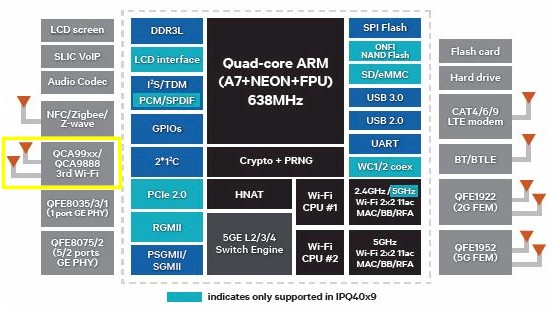Julio Urquidi
News Editor
If you've been wondering whether Qualcomm would let Broadcom have the market for tri-radio routers all to itself, you now have the answer. Today at Computex 2016, the company announced its tri-radio 802.11ac platform.

Both are built around Qualcomm’s IPQ40x9 802.11ac SoC, introduced last October, which supplies a 2x2 2.4 GHz radio and one 2x2 5 GHz radio. The second 5 GHz radio can be added via PCIe, using either the 2x2 QCA9886 or 4x4 QCA9884.
Qualcomm's new platform should enable lower cost tri-radio designs than Broadcom's platform, which requires an external PCIe switch to add another port to the aging BCM4709 processor to support the third radio and has all radios as separate devices. But Qualcomm's platform requires the IPQ40x9 SoC to perform processing duties for the third radio, while each radio in Broadcom's solution has its own CPU. It also limits two of the radios to 2x2, while Broadcom's solution handles three or four stream devices for all radios.
The announcement makes no mention of an equivalent to Broadcom's "Smart Connect" automatic band-steering and load balancing technology. Instead, it implies a simpler design where the 2.4 GHz radio will be used to support older legacy wireless products and one of the 5 GHz radios can be used as a dedicated range extender or mesh wireless link. This could better position Qualcomm's platform as a more logical choice for the upcoming generation of multi-AP "mesh" architectures, like those from eero and Luma and newer entrants from Ignition Design Labs and Securify.
The new platforms support both MU-MIMO and Wi-Fi SON (Self-Organizing Networks), its technology for creating self-configuring and self-managed Wi-Fi networks, announced in January. Qualcomm also announced that Wi-Fi SON now supports its HomePlug AV2 powerline solutions, providing even more options for creating multi-AP networks.
The new devices are sampling now. Amped Wireless may be first to market with its ARTEMIS 2x2 MU-MIMO router that is using an IPQ4018. Qualcomm's announcement also contained quotes from ASUS, Linksys and TP-LINK.

Both are built around Qualcomm’s IPQ40x9 802.11ac SoC, introduced last October, which supplies a 2x2 2.4 GHz radio and one 2x2 5 GHz radio. The second 5 GHz radio can be added via PCIe, using either the 2x2 QCA9886 or 4x4 QCA9884.
Qualcomm's new platform should enable lower cost tri-radio designs than Broadcom's platform, which requires an external PCIe switch to add another port to the aging BCM4709 processor to support the third radio and has all radios as separate devices. But Qualcomm's platform requires the IPQ40x9 SoC to perform processing duties for the third radio, while each radio in Broadcom's solution has its own CPU. It also limits two of the radios to 2x2, while Broadcom's solution handles three or four stream devices for all radios.
The announcement makes no mention of an equivalent to Broadcom's "Smart Connect" automatic band-steering and load balancing technology. Instead, it implies a simpler design where the 2.4 GHz radio will be used to support older legacy wireless products and one of the 5 GHz radios can be used as a dedicated range extender or mesh wireless link. This could better position Qualcomm's platform as a more logical choice for the upcoming generation of multi-AP "mesh" architectures, like those from eero and Luma and newer entrants from Ignition Design Labs and Securify.
The new platforms support both MU-MIMO and Wi-Fi SON (Self-Organizing Networks), its technology for creating self-configuring and self-managed Wi-Fi networks, announced in January. Qualcomm also announced that Wi-Fi SON now supports its HomePlug AV2 powerline solutions, providing even more options for creating multi-AP networks.
The new devices are sampling now. Amped Wireless may be first to market with its ARTEMIS 2x2 MU-MIMO router that is using an IPQ4018. Qualcomm's announcement also contained quotes from ASUS, Linksys and TP-LINK.

